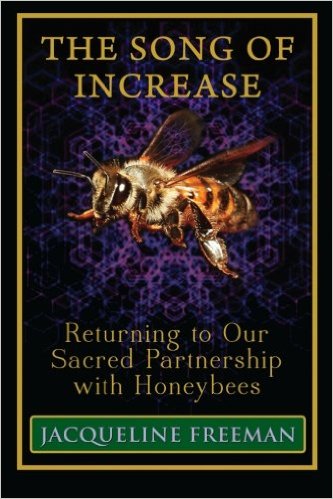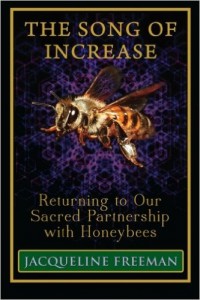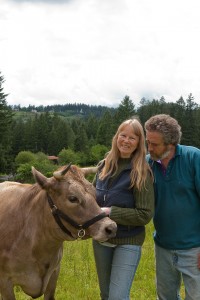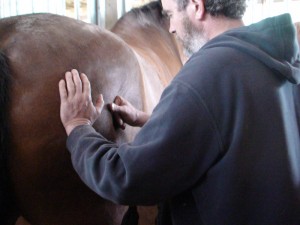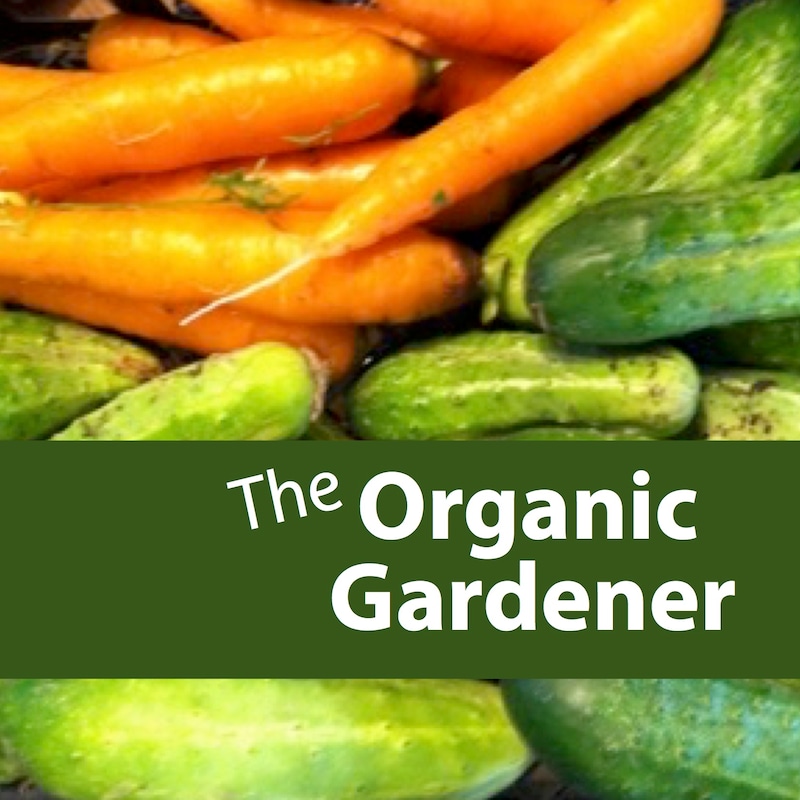
Shownotes
Originally published March 12, 2016 Jacqueline Freeman and I will be featured during the Soil Health Summit hosted by the TableTopFarmer starting December 12, 2018. To learn more sign up here!
Treatment-free Beekeeping
or now on
If you’ve never tried audible you can get a free audio book from the Organic Gardener Podcast and audible today!
The Song of Increase by Jacqueline Freeman
JACQUELINE FREEMAN is a pioneer in the emerging field of natural beekeeping. A biodynamic farmer, she is gifted in perceiving nature intelligences, particularly honeybees, and has spent many years working alongside them with an open and prayerful heart. Her work with the bees has uncovered how bees fulfill broader roles in the hive and in nature. Jacqueline teaches bee classes at her farm and honeybee sanctuary in Washington state.
 The documentary movie “Queen of the Sun” showed her caring work as a gentle swarm rescuer. Her bee articles appear in national magazines and anthologies. She is a featured speaker at conferences for organic and treatment-free beekeeping, permaculture and sustainable agricultural.
The documentary movie “Queen of the Sun” showed her caring work as a gentle swarm rescuer. Her bee articles appear in national magazines and anthologies. She is a featured speaker at conferences for organic and treatment-free beekeeping, permaculture and sustainable agricultural.
In 2013, the Dominican Republic hired her to work with rural beekeepers to help them create healthy bees through respectful and treatment-free beekeeping. Jacqueline’s ongoing bee work is updated on the website: SpiritBee.com. Jacqueline and her husband Joseph live on their biodynamic farm in southwest Washington. (from amazon)
Friendly Haven Rise Farm
Where Spirit and Nature Meet
Our farm is located in the tiny village (pop. 2000) of Venersborg in southwest Washington. We have beef and dairy cows, dairy goats, layers and broiler chickens, seasonal turkeys and many honey bees. The farm is a bee sanctuary with native pollinator hedgerows and blooming bee pastures.
We grow a dozen kinds of apples, grapes, berries and other fruit. We’ve got a vegetable garden and two greenhouses so we can grow food year round. We grow and bale our own hay and always have a construction project going.
Living on a working farm is a real pleasure and even when the work is hard, we feel blessed to be in partnership with this land. We work with joyful hearts and open minds in gratitude for the many lessons our good farm teaches.
Hunter Lyndon told me about today’s guest in episode 64 said ” She’s an amazing bee woman in Washington who you can watch in the video documentary movie “Queen of the Sun.””
So wonderful to hear Hunter is the one who connected us.
He’s really sweet, everyone who knows him as great things to say about him
1. Tell us a little about yourself.
Farming for 15 years, bought our 100 year old farm 15 years ago. Were second owners, it’s always been organic, and it was because of frugality more then a political action. Then we came in, we did not intend to become farmers, at all, that was not the direction we intended to go in at all. My husband works with horses, and I run a school for people who want to work with horses.
And that’s what we thought we’d be doing. But once we bought this farm, we bought it because we’re both from small towns in New England and we both want to move to the west, but we wanted to live in a small town again. But once we bought this farm, it’s funny
This farm wanted to put itself back together again and be a farm. I got started in chickens because one day my neighbor down the street raises heirloom chickens, Brenda, showed up at my door and said you have a farm and said you should have chickens…
I said, “Well, ok, that would be good!”
She said “Great! I have some in my car!”
And you know chickens are the gateway animal on a farm!
The next year I had a friend in Portland, OR, and she had a friend who had just sold her house and had some bees in a hive in the woods behind her house, and they had been abandoned and the new owner didn’t want bees in the backyard. And she said the same thing:
“You have a farm, you should have bees!”
Never having a clue, how much that decisions would change my whole life. The next year, I started dreaming about cows …
I’d wake up in the morning and say, cows in the field and cows in the barn? And so we went out and got a cow, and she became the mother to many. At the maximum we had 8. My husband just came in from milking her right now. We have seasonal animals like the turkeys, and dairy goats and my bees have turned into hundreds and thousands of honeybees.
Wow! That’s quite the introduction. Now do you have horses?
Now isn’t that funny? That’s the one animal we don’t have.
Equine Natural Movement School
When we teach people to work with horses, my husband works with them all the time, and when you teach people to work with horses, we teach people with fresh horses. That’s the reason we don’t have them here. I grew up with horses, I probably have a 30 year background with horses. But we decided not to have them here because for students, it’s actually better to always have new horses so they can tell the effect of their work.
I don’t know anything about horses. I guess, you’re training, breaking a new horse?
He does a kind of work called structural integration, on horses, and teachers people how to do it as a career. His school is called the Equine Natural Movement School. And that’s what it does, it brings horses back into balance and structure and they become more fluid in their movement and it’s easier for them to be healthy and strong and stable and sturdy. If someone shows, their horses, it helps with the grace of their movement.
I do usually start the show asking about your very first gardening experience. Were you a kid or an adult, who were you with, what did you grow?
Gosh, I never had a garden when I was little. I didn’t, I lived in the country. I had ponies….
I was a little girl and I had ponies, and that’s what I was completely wrapped up. One time I planted radishes. I was so surprised that they grew at all. That was kind of an experience.
We lived up in the outskirts of Seattle for a few years, we started having gardens there and that was kind of fun. Here we put up some raised beds, we went to the local store where you can get compost soil. We had some clayish soil and we were supplementing it, we built this raised beds.
This stuff smells funny
We took the truck down and filled up our beds with this nice dirt, one of the truck loads though my husband said, “This smells funny, doesn’t smell like the other stuff?”
We planted our food, and kind of forgot about it, but then things started coming up in half the beds, and yellow and curled and obviously, very damaged. And we went what the heck is that? Why is it those beds? and not in these beds? And then an article came out. a lot of the golf courses take their clippings to be made into compost, it’s just a place where you can bring your branches, and leaves and grass clipping and they turn them into compost… they sell the soil, compost, three way soil.
It turned out there was a chemical that the golf course that doesn’t have a short half life, it had a 2 year break down period!
So when that refuse was broke down into compostable material, the chemicals the toxic chemicals in it were still active. So we had picked up a truck full of contaminated soil/ It was a heart breaker and there farms who were organic around her and they lost their certification and now they had toxic chemicals on their stories and they had to go back and start all over from the beginning!
Clean and re-certify!
I was furious! Wait a minute I’m growing stuff in my backyard!
We were furious!! We were not that strong about organics back then … I really wasn’t buying organic food at that point, I didn’t know enough about it! That politicalized us! I was so mad, I thought here I am growing food in my backyard. If it had it grown and we had eaten it… terrible chemical and none …. it was awful … none of the helpful bugs were alive…
We need to be really on top of this. How can we trust what we’re buying in the store? Up until then we had bought conventional food without even thinking about it. From that point on everything I bought, if I pick up something that it has 98% I’m like what’s in the 2%? Toxic chemicals?!
organic
I don’t want to support
we had to dig it all out! We took it to the dump, that’s trash dirt …
It’s got to sit there for 2 full years because it’s clean… compost can dismantle a lot of chemicals, when something has that long of a half life … you have to wait it out, mother nature is brilliant about how to dismantle things.
I know Jon Moore from the Organic World News over in Australia talked about golf courses when he we son my show! I’ve seen what manure’s done on our land, we’ve gone from forest land, I know mowing the lawn but we sprinkled just manure around and I know that makes a big difference. We have a beautiful lawn and I’m just as nice as a golf course. I’ve brought some stuff home from the big box stores that said it was organic Mike wouldn’t put it on his stuff, he said he’d bought it before and it killed some of his plants. And also Peggy Jane Ousley was on my show and talked about a lot of people around here getting weed-free manure, which you would think, “Free” is chemical free” but really what it means is it has chemicals that make it weed-free and it ruined a lot of gardens …
Weed free Manure
The marketers know what to write, oh weed-free that sounds good, I don’t want any weeds in my garden. So you have to step back and go, “How would it get to be weed free?”
We’re also biodynamic by the way, a few years after we started being organic, we got into permaculture and loved that and then maybe 2 years after that we started getting into being biodynamic. We have cows. I read that a cow makes 80 lbs of manure a day! And I can believe that. 80-100 lbs depending on the size of the cow. So we make a great deal of compost!
Biodynamic
I had this weird thing that happened one time … we put in a big septic system … past the septic/ From the septic to the leach field it was probably about 300 feet … when they buried that ditch back in there was a big long scar of red clay … towards fall … I had some women who were interning with us, I said lets spread some compost over it, I have this truck load here with biodynamic compost, it’s very potent you only need to sprinkle a half an inch. So we spread it out along the … we ran out of the compost maybe a hundred feet short of the leach file. That’s enough we; pick up again next spring when we’ll make some more … the stripe that we had sprinkled the compost….
It found every single flower seed in the soil. It was like some of these seeds probably been waiting 40 years to have something nurturing come and find them. It was so beautiful we had evening primrose, and asters, all kinds of beautiful flowers, all along this stripe going down the middle of the house … red clay scar with almost nothing growing on it.
I’m gonna leave this here and we can watch and see how long nature takes to bring it back. It’s probably been about 3 years and pits spotted then where we put the compost on and compare it to where we put the biodynamic compost on … what a difference … except that skinny little half inch of that biodynamic compost on top of that red scar of clay. When you dig up a ditch … when you put that dirt in that ditch you don’t have that layer of top soil there anymore.
Whatever was down further in my clay … it’s good soil with lots of minerals, it’s not loamy and rich like the bottom land is that is down form us.
Do you want to explain to listeners what biodynamics is because I did’ there that till I started my podcast and maybe listeners don’t know because I still don’t know much…
Biodynamics is a really beautiful system started by Rudolph Steiner who was a scientist and a philosopher. The thing that appealed to me about it is, the approach that we have on the farm, this goes if you have a backyard or a little house you treat everything as if it was a living breathing entity.
I did something biodynamic, I was dreaming about cows. And I was wondering about that, its the farm telling us we should have cows here again. That’s reaction is kind of what you do in biodynamics. How do you respect your land? How do you act in concordance with it? How do you bring this land to its’ fullest expression of life and vitality?
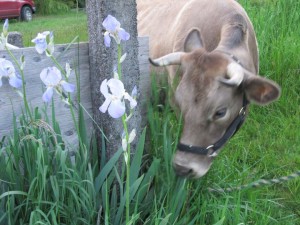
Like bringing the cows, to making the compost to … you treat it in love and with respect and you are always respectful of the spirit of everything.
I’m not a normal biodynamic farmer, I’ll just say that upfront because I have some quirky little things, I do just because I do them just because I’m me…my girlfriend Patti who also has a biodynamic farm, says “You’re not a farmer…you did up your weeds and you go plant them somewhere else and farmers don’t do that.”
What I’m resounding to is sometimes I’ll see something in the garden coming up and I’ll go that is the most beautiful vital oh, what weed would be a good example, let’s say a dandelion? … That is the most beautiful mound of dandelion or chickweed! or something, I’ll dig it up and I don’t want to just plant it on my compost pile, I’ll say keep growing…
It makes it so much fun to interact with the life on the farm in that manner. My husband is like that with animals on the farm, he has such a tremendous respect for what their needs are. How to interact with them that your are always honoring the life spirit in that animal?
Now Rudolph Steiner is from the Waldorf schools right?
He started Waldorf schools, he had the first concept for the first CSA’s for people who didn’t have gardens in their backyards, so they would participate with the famers gardening …. with their hands a little bit, and they would have more of an understanding of how their food was, it was more participatory, some CSAs still do that, they will have a farm day, where everyone comes out, others are more where the works is done and you just trust that it’s being done well, you don’t really get your fingers dirty.
He was just amazing, anthropocropic medicine, eureitimie … just really brilliant, different kinds of psychotherapy, everything he looked at he seemed to have animate understanding of the harmony in all of life he worked to bring that out … biodynamic agriculture was something that came along from working along side farmers that were not being as productive as they could be.
Just as a coincidence I grew up when my mom’s backyard backed up against a Waldorf school, and there was the school and then the soccer field with a d a track around it and then it was surrounded by a nature trail, and I think that always influenced my life having that school and nature trail back...
